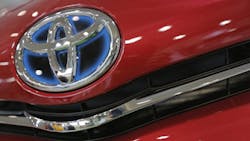TOKYO -- Dealing another blow to the world's largest automaker whose reputation for quality and safety has been dented in recent years, Toyota (IW 1000/8) on Wednesday recalled 6.39 million vehicles globally over a string of problems.
Despite record sales and bumper profits, Toyota has been fighting to protect its brand after earlier recalls involving millions of vehicles.
Last month it reached a deal to pay $1.2 billion to settle U.S. criminal charges that it covered up a sticky pedal blamed for dozens of deaths.
Rival General Motors (IW 500/5) has also been sideswiped by accusations that it hid a decade-long ignition and airbag problem linked to 13 deaths.
There was no apparent link between GM's woes and an airbag issue that Toyota announced Wednesday as part of its broad recall.
The company issued five recalls involving 26 Toyota models, as well as the Pontiac Vibe and the Subaru Trezia, with some models affected by more than one recall.
The Vibe, based on Toyota's Matrix model, was produced at a US factory which was jointly owned by the Toyota GM. The Trezia is a rebadged version of Toyota's Ractis subcompact.
Toyota said "we sincerely apologize" for the recall, adding that it has "re-dedicated itself to strengthening its commitment to safety and quality."
"In part, this means re-focusing on putting customers and people first, by listening better and taking appropriate action," the firm added.
Among the other problems are a driver's seat defect, steering column problems and an engine starter glitch that posed a fire risk. Toyota said it had received two reports about fires due to the starter defect, but added that none of the issues had caused any accidents to its knowledge.
The affected vehicles include the Corolla sedan, the RAV4 sport utility vehicle and the Yaris subcompact.
The vehicles were made over the past decade. Toyota said the recall affects 1.08 million vehicles in Japan, 2.3 million in North America, about 770,000 in Europe and 62,000 in China, with the rest from other regionsIn 2012 Toyota announced a global recall of 7.43 million vehicles, including its popular Camry and Corolla models, over a possible fire risk, while in February it recalled 1.9 million of its signature Prius hybrid cars.
Quality Issues in Industry
Last month Toyota agreed to pay $1.2 billion to settle U.S. criminal charges that it lied to regulators and the public as it tried to cover up deadly accelerator defects, which caused vehicles to speed out of control and fail to respond to the brake.
Toyota eventually recalled 12 million vehicles worldwide in 2009 and 2010 at a cost of $2.4 billion over the issue.
As part of the settlement, Toyota admitted that it lied when it insisted in 2009 that it had addressed the "root cause" of the problem by fixing floor mats that could trap the accelerator.
Despite the damage to its reputation, Wednesday's recall was unlikely to have a big impact on Toyota's bottom line, said Shigeru Matsumura, an auto analyst at SMBC Friend Securities.
"The company has put aside a plenty of reserves" for recalls, he added.
"Automakers these days are trying to take early, voluntary measures as they have become more sensitive to quality issues."
Rivals including Nissan and Honda have also issued major recalls in recent years.
Last week GM's chief executive Mary Barra pledged to be forthcoming with results of a sweeping internal probe into what led it to keep using ignition switches it knew were faulty for years, then change the parts without alerting the public or regulators.
"We will share anything and everything related to vehicle safety," Barra told a Senate subcommittee, as members accused GM of "criminal deception".
The Toyota recall came as Jiji Press news agency said Wednesday that the automaker's global sales in the fiscal year to March topped 10 million units for the first time.
The company, which declined to comment on the report, kept the title of world's biggest automaker in 2013 with sales of 9.98 million vehicles, outpacing Volkswagen and GM.
- Peter Brieger, AFP
Copyright Agence France-Presse, 2014
About the Author
Agence France-Presse
Copyright Agence France-Presse, 2002-2025. AFP text, photos, graphics and logos shall not be reproduced, published, broadcast, rewritten for broadcast or publication or redistributed directly or indirectly in any medium. AFP shall not be held liable for any delays, inaccuracies, errors or omissions in any AFP content, or for any actions taken in consequence.
